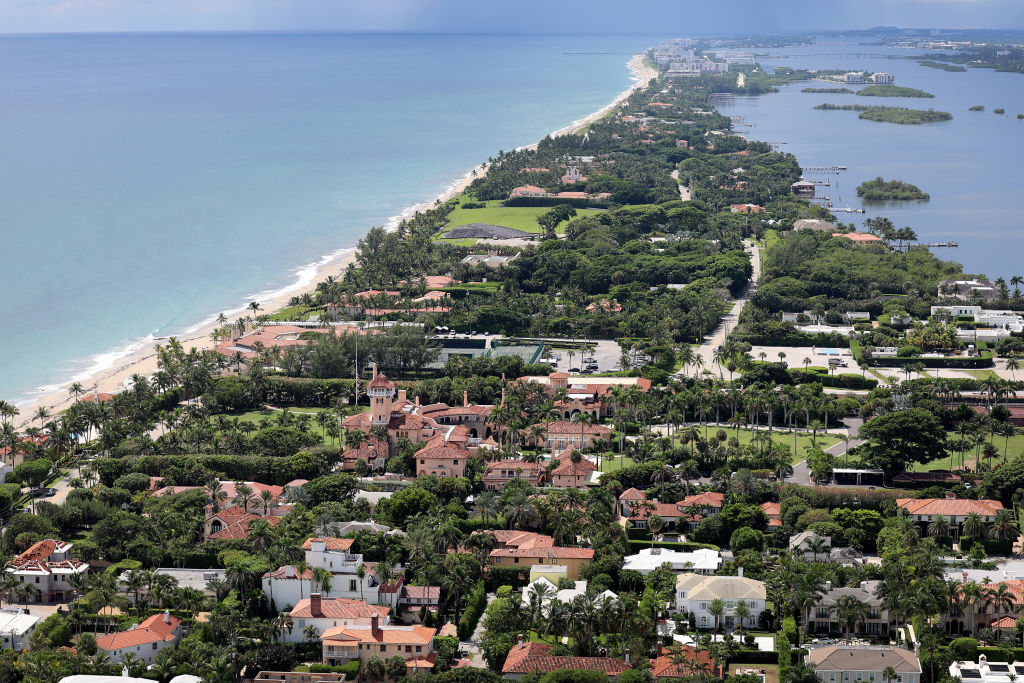Palm Beach is never happier than when it’s making news – the more unexpected the better. The latest opportunity to pat itself on the back came in the wake of Palm Beach resident Donald J. Trump’s “silly” wheeze (according to the local paper) to make Canada the 51st state.
Whereas overall, as a result of President Trump’s speculations, visits to America by Canadians dropped by 2 percent in February – with a whopping 70 percent decline in bookings in March – reservations on flights from north of the 49th parallel to Palm Beach International Airport actually rose by 15 percent. The place remains popular, even for Canadians.
The Palm Beach Daily News has installed the ‘Trump Tracker,’ charting his every movement at Mar-a-Lago
It’s not all good news, however. Since Trump entered office, the local newspaper, the Palm Beach Daily News, has installed a new feature called “Trump Tracker” so it can report on his every movement while he is at Mar-a-Lago, his “Southern White House.” One of the paper’s stories is that the “Trump Bump” – the surge in local property prices (property prices being the civic religion here) – is over. For a brief time, from his election until Easter, real estate enjoyed a brief boom – but no more.
But we shouldn’t get too excited. The Trump Bump was really a boom on top of a boom that has been going on since Covid, which brought many northerners, Midwesterners and San Franciscans to the Sunshine State. The number of single-family homes changing hands – apartments as well as houses – is up 60 percent year on year.
And how about this: to prove that buying and selling real estate beats working for a living, the latest news is that one property here, which sold in 2019 for an already very healthy $16 million, has just sold again, barely six years on, trebling in value to a staggering $48.5 million.
House prices are not the only thing jumping. The problem with Palm Beach – and it is becoming ever more acute – is that it is a sliver of an island, 12 miles long but only half a mile wide, connected to the mainland by three drawbridges that go up every half hour, with the roads held aloft, on average, for roughly 12 minutes. With the island being so popular, traffic has increased markedly: by no less than 100 percent in the past year and by a staggering 200 percent in the very center of town.
This increase has nothing to do with President Trump’s visits, which force the closure of some roads when he’s here, because the survey was taken while he was in Washington. This is putting increasing strain on the island’s roads, which are held at a standstill when the bridges are raised. Gridlock is virtually island-wide.
As a result, increasingly radical solutions are under consideration. One is that construction companies must shuttle their employees to and fro across the water in boats, so as not to use the roads joining the island and the mainland.
Another is to have a massive scheme of underground car parks sunk, more or less, across the entire island. But how long would those take to build – and where would the traffic go in the meantime?
A third is to ban all new private clubs (much in demand, so sought-after is the island), and to allow new restaurants to open only if they can convince the town council that they have adequate space for their valet-parking schemes.
The man chased after the ‘ding-dong-ditch’ pranksters in his Range Rover – and then pointed a gun at them
The shuttle scheme is being fiercely resisted by the construction companies, who say they are being unfairly targeted, and that it is the growth of tourism that is causing the traffic problems. To an extent, they have a point. Two new hotels have just been built, which of course are bringing in yet more tourists. The island has a finite surface area – and it is rapidly approaching saturation.
After cars, guns. This being America, like anywhere Palm Beach has an occasional problem with guns. Two episodes took place recently, the first when one driver annoyed another by switching lanes unexpectedly in the middle of town, only to have the “annoyed” driver pull a gun on him. No one was injured.
In the other case, a group of teens were playing a game called “ding-dong-ditch,” where someone rings a doorbell and then runs away, leaving the person answering it faced with thin air. However, this particular doorbell was fitted with a camera, which records all instances where someone rings the bell. And in this case, the teens later told the police that the man who lived at the house where they rang the bell rushed out and got into his Range Rover, drove after them, stopped them in the street and pointed his gun at them. The man was later directed to hand in his gun.
The Palm Beach teens were lucky. An 18-year-old died in Virginia in May after he was shot as part of a ding-dong-ditch prank that he had intended to post on TikTok. In 2020, three teens in California were killed after playing the same prank. A boy rang Anurag Chandra’s doorbell then dashed back to his friends, who were waiting in the dar. Chandra jumped into his car and gave chase, eventually ramming the boys off the road – and into a tree. Three of the six teens died. And in 2003, in Boca Raton, a 16-year-old was shot in the back playing the same game. The gunman, who pleaded guilty to manslaughter, was sentenced to 52 weekends in jail and ten years’ probation.
This article was originally published in The Spectator’s July 2025 World edition.


























Leave a Reply